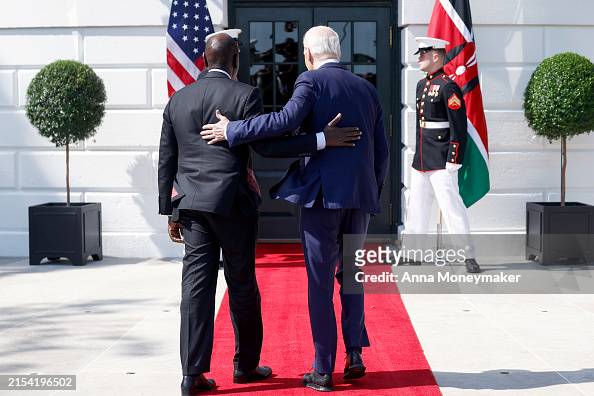By Frank Kamuntu
Kenyan President William Ruto on Wednesday opened the first state visit to Washington by an African leader in more than 15 years as President Joe Biden seeks to counter geopolitical headwinds across the continent.
Biden welcomed his Kenyan counterpart at the White House and then joined him meeting business leaders ahead of Thursday’s formal portion of the visit, which will start with an honor guard and culminate in a lavish dinner.
Jake Sullivan, Biden’s national security advisor, said the visit highlights the “important role in global peace and security” by Kenya, which has worked with the United States on hotspots including Somalia and more recently Haiti.
He also saluted Ruto as a “leading voice” on reducing the mounting debts of developing countries and said Biden would make an announcement on the issue.
“We are demonstrating how, as President Biden has said himself, the United States is all in on Africa, and all in with Africa,” Sullivan told reporters.
But Biden, after holding a major summit for African leaders in late 2022, has not made good on promises to visit the continent as president.
While Africa has often been on the back burner for US diplomacy, the continent has become a growing headache for Washington.
Russia has made growing inroads — most recently in Niger, where the United States has agreed to withdraw its 1,000 troops — and war has ravaged countries including Sudan.

The United States also faces competition from China, which has pumped billions in infrastructure money into Africa for the past two decades.
He noted that Kenya has been fighting Al-Shabaab, the Islamist militants in neighboring Somalia also blamed for attacks at home, “for the last almost 20 years.”
An African Union peacekeeping force known as ATMIS is set to leave Somalia at the end of the year.
Ruto said he hoped to work with the United States to “make sure that the drawdown of ATMIS troops does not create a vacuum that will end up being filled by Al-Shabaab.”
“Kenya and the United States and frontline states need to work together to see how that can be done — not calendar-based withdrawal, but conditions-based withdrawal.”
Ruto said he was also asking Congress for a 10-year extension to the African Growth and Opportunity Act, a landmark trade pact set to expire in September 2025.
One top issue on the agenda is the imminent arrival of Kenyan police officers at the head of an international force to restore order in chaos-torn Haiti.
A first batch of Kenyan police is expected to make the 12,000-kilometer (7,500-mile) journey to the Haitian capital Port-au-Prince this week, security sources told AFP, despite a fresh court challenge in Nairobi against the deployment.
Ruto has defended the undertaking as a “mission for humanity” in the Western hemisphere’s poorest nation, which has suffered from poverty, political instability and natural disasters for decades.
The United States is the largest backer of the force, pledging more than $300 million since the Haiti crisis intensified several years ago.

The United States has long depended on regional partners in Africa but relations have soured with some key countries, noted Cameron Hudson, a senior fellow with the Center for Strategic and International Studies.
South Africa has angered the United States by refusing to join sanctions on Russia following the Ukraine invasion and by bringing a case against Israel alleging genocide.
Ethiopia fell from US good graces over the brutal war in its Tigray region, while Nigeria, the continent’s most populous nation, has faced internal tumult.
“So Kenya really stands alone right now, I think, among regional powers that the United States can rely on,” Hudson said.
Have An Advert Or Article You Want Us To Publish? WhatsApp: +256760530830.

